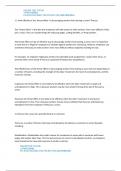OSCAR THE TUTOR
+27844708483
For ECS,FAC,MAC,TAX,FIN,INV,TAX,QMI,MNB,BNU
tutoring
1.1 How effec ve is the ‘threat effect’ in discouraging workers from joining a union? Discuss.
The "threat effect" is the idea that employers will take ac on to make workers' lives more difficult if they
join a union. This can include things like reducing wages, cu ng benefits, or firing workers.
The threat effect can be an effec ve way to discourage workers from joining a union, but it is important
to note that it is illegal for employers to retaliate against workers for unionizing. However, employers can
some mes find ways to make workers' lives more difficult without explicitly viola ng the law.
For example, an employer might give workers less desirable work assignments, reduce their hours, or
promote them more slowly if they are suspected of being union sympathizers.
The effec veness of the threat effect in discouraging workers from joining a union will vary depending on
a number of factors, including the strength of the labor movement, the level of unemployment, and the
economic climate.
In general, the threat effect is more likely to be effec ve when the labor movement is weak and
unemployment is high. This is because workers may be more afraid of losing their jobs if they join a
union.
However, the threat effect is less likely to be effec ve when the labor movement is strong and
unemployment is low. This is because workers may be more confident that they can withstand any
retalia on from their employer if they join a union.
1.2 Discuss the causes of a possible decline in unionism.
There are a number of factors that have contributed to the decline in unionism in recent decades,
including:
Globaliza on: Globaliza on has made it easier for companies to move jobs to countries with lower
wages and weaker labor laws. This has put pressure on unions in developed countries, as employers
have threatened to move jobs overseas if workers unionize.
OSCAR THE TUTOR
+27844708483
For ECS,FAC,MAC,TAX,FIN,INV,TAX,QMI,MNB,BNU
tutoring




